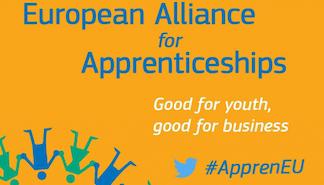What is the European Alliance for Apprenticeships?
Launched in 2013, the EAfA brings governments together with businesses, education and training providers, social partners, professional bodies and networks, non-profit and youth organisations, Chambers of Commerce and more to tackle youth unemployment.
Members of the EAfA are committed to taking action to strengthen the quality, supply and image of apprenticeships.
Why was it established?
The economic crisis of 2008 hit young people particularly hard, with youth unemployment booming across Europe. While these rates have begun to fall in most countries over the last several years, the high levels of youth unemployment continue to be a concern.
Apprenticeships were recognised as a particularly effective way to help young people find employment as the combination of learning in school and on-the-job training gives them the unique skills mix that modern employers need.
What has the EAfA achieved so far?
By March 2017, the Alliance’s achievements included the following:
-
35 countries involved;
-
Over 200 pledges made by members, focusing on quality, supply, image and mobility;
-
Over 500,000 training and job opportunities for young people mobilised;
-
EU Member States have included apprenticeships in their Youth Guarantee schemes, leading to 390,000 offers by 2016.
Why offer an apprenticeship?
Apprenticeships are a great way of bringing young people, with fresh ideas, into your company and training them up to meet your company’s needs and fill skills gaps. There’s also financial support available through programmes such as the Youth Guarantee.
What are the benefits of joining the EAfA?
Becoming a member of the Alliance brings increased visibility and access to a European network of apprenticeships where you can share best practices and learn from the experiences of others. You’ll receive information on guidelines, practical tools, reports and funding opportunities, as well as invitations to relevant workshops and events.
How can my organisation join the Alliance?
Your organisation can join the EAfA by making a short pledge, and sending it to empl-eafa ec [dot] europa [dot] eu (empl-eafa[at]ec[dot]europa[dot]eu). This pledge could cover one of the following areas:
ec [dot] europa [dot] eu (empl-eafa[at]ec[dot]europa[dot]eu). This pledge could cover one of the following areas:
-
Up-scaling an existing programme or initiative;
-
Launching a new partnership or pilot scheme;
-
Starting apprenticeships in a new country;
-
Facilitating mobility;
-
Working on quality;
-
Building awareness and attractiveness or other relevant actions.
You’ll then need to provide information on your activities and the results of the pledge at least once a year, via an online survey.
Where can my organisation find out more?
Visit ec.europa.eu/apprenticeships-alliance to find out more about the Alliance and how to complete a pledge. There’s also an EAfA LinkedIn group you can join or you can email empl-eafa ec [dot] europa [dot] eu (empl-eafa[at]ec[dot]europa[dot]eu) with any questions.
ec [dot] europa [dot] eu (empl-eafa[at]ec[dot]europa[dot]eu) with any questions.
Related links:
European Alliance for Apprenticeships
Read more:
Working and living conditions in EURES countries
EURES Jobs Database
EURES services for employers
EURES Events Calendar
Upcoming Online Events
EURES on Facebook
EURES on Twitter
EURES on LinkedIn
EURES on Google+
Details
- Publication date
- 1 August 2017
- Authors
- European Labour Authority | Directorate-General for Employment, Social Affairs and Inclusion
- Topics
- EU toolbox for mobility
- Labour market news / mobility news
- News/reports/statistics
- Youth
- Related section(s)
- Sector
- Accomodation and food service activities
- Activities of extraterritorial organisations and bodies
- Activities of households as employers, undifferentiated goods- and services
- Administrative and support service activities
- Agriculture, forestry and fishing
- Arts, entertainment and recreation
- Construction
- Education
- Electricity, gas, steam and air conditioning supply
- Financial and insurance activities
- Human health and social work activities
- Information and communication
- Manufacturing
- Mining and quarrying
- Other service activities
- Professional, scientific and technical activities
- Public administration and defence; compulsory social security
- Real estate activities
- Transportation and storage
- Water supply, sewerage, waste management and remediation activities
- Wholesale and retail trade; repair of motor vehicles and motorcycles
